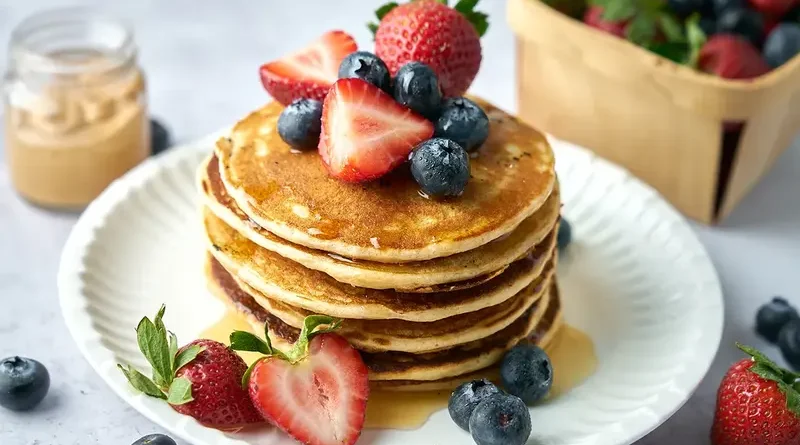Morning Delights: Dive into the World of Healthy Pancakes
Greetings from the land of healthy pancakes! In a food environment where nutrition is sometimes overshadowed by luxury, the search for better substitutes is nevertheless crucial. This article delves into the world of pancakes, showing how a few easy adjustments and substitutes for ingredients may make this popular breakfast staple a nutritious treat.
Whether you’re looking for a guilt-free treat or you’re a health-conscious person, come learn how to make pancakes that will not only tempt your taste buds but also promote your overall well-being.
Key Ingredients for Healthy Pancakes
Choosing the right ingredients is crucial for crafting healthier pancakes. Choose whole grain flour over refined flour, such as oats or whole wheat flour, which are higher in minerals and fiber. Add extras high in protein, like eggs or low carb Greek yogurt, to help with muscle regeneration and satiety.
For a healthier sweetness, use natural sweeteners like pure maple syrup or mashed bananas in place of refined sugar. To improve the nutritional profile of your pancakes, try adding chia seeds or flaxseed meal, two nutrient-dense add-ins. You may make tasty and nourishing pancakes by choosing these essential ingredients.
Exploring Healthy Pancakes Alternative Flours and Grains
While refined white flour is frequently used in traditional pancake recipes, experimenting with different flours and grains can improve the taste and nutritional value. Nutritious options include buckwheat flour, almond flour, coconut flour, quinoa flour, oat flour, and whole wheat flour.
Compared to refined flour, each delivers distinct aromas and textures as well as more fiber, protein, vitamins, and minerals. Pancakes for every meal can become healthier and more satisfying by experimenting with these substitutes.
Incorporating Superfoods and Nutrient Boosters
Add superfoods and vitamin boosters to your pancakes to increase their nutritional worth. Nutrient-dense foods such as cacao nibs, hemp seeds, matcha powder, blueberries, flaxseed meal, and chia seeds are abundant in vitamins, minerals, and good fats. These additives give your pancakes a great flavor and texture while also enhancing their health benefits. Try blending these superfoods into your pancake mixture to make filling, healthy meals that will nourish your body and mind.
Healthy Pancakes Sugar Substitutes and Sweeteners
For a healthier breakfast, pancakes should have less added sugar. To add sweetness without the negative effects of refined sugars, use natural sweeteners such as mashed bananas, pure maple syrup, or honey. Coconut sugar and stevia are other great substitutes; they provide sweetness without the added calories. You may still enjoy tasty pancakes without sacrificing flavor or nutrients by carefully selecting these replacements.
Healthy Toppings and Accompaniments
Use nutritious toppings and sides to up the nutritional content of your pancakes. For added vitamins and antioxidants as well as natural sweetness, choose fresh fruits like sliced bananas or berries. For a creamy texture and protein boost, use Greek yogurt instead of regular whipped cream.
For extra crunch and beneficial fats, sprinkle on some nuts or seeds. Try combining different ingredients to make tasty and nourishing pancake toppings that fit your dietary requirements and personal tastes.
Cooking Methods for Healthy Pancakes
The nutritional content of your pancakes can be greatly impacted by the cooking technique you use. Use non-stick skillets or griddles to reduce the use of additional fats, such as butter or oil. As an alternative, consider grilling or baking pancakes to get a great smoky flavor with less added oil. Another method that cooks pancakes with little additional fat is steam-frying, which combines steaming and frying. Try out these healthier cooking techniques to enjoy nutrient-dense and tasty pancakes.
Portion Control and Serving Suggestions
Portion Control:
To properly control portion sizes, choose smaller pancakes or split larger ones into smaller ones. To enjoy pancakes without going overboard, moderation is essential.
Balanced Plate:
Serve protein-dense items like Greek yogurt or eggs with pancakes, along with fresh fruit or a side salad, to make a well-balanced meal that is high in vital nutrients.
Whole Food Toppings for Healthy Pancakes:
To improve flavor and nutritional content, use healthy toppings like Greek yogurt, almonds, seeds, or fresh fruit rather than sweet syrups or whipped cream.
Protein Pairings:
To promote muscle growth and repair, couple pancakes with protein sources like eggs, cottage cheese, or smoked salmon.
High-Fiber Add-Ins:
Add high-fiber components to pancake batter, such as chia seeds, flaxseed meal, or oats, to help with digestion and satisfaction.
Moderate Sweetness:
To add sweetness without using too many added sugars, use natural sweeteners in moderation, such as pure maple syrup, honey, or mashed bananas.
Hydration:
To promote general health and hydration levels throughout the day, pair pancakes with a hydrating beverage like water, herbal tea, or freshly squeezed juice.
Conclusion
Finally, our exploration into the world of healthy pancakes has revealed a wealth of opportunities for creating delectable and nourishing breakfast treats. We can turn ordinary pancakes into healthful treats that feed the body and the soul by experimenting with different flours and grains, adding superfoods and nutritional boosters, and using clever cooking techniques.
Pancakes may be a guilt-free treat that promotes our well-being if quantity control, balanced pairings, whole-food toppings, and thoughtful sweetness are prioritized. So, whether you’re looking for a tasty breakfast alternative or you’re just health-conscious, learn how to make pancakes that will not only tempt your taste buds but also improve your general health and energy.
You Can Read More About Pancakes
Easy Einkorn Pancakes Recipe for Beginners
